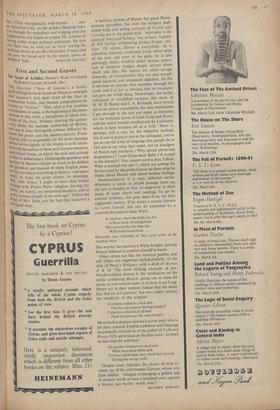First and Second Graves
THE Gravidae ("Sons of Graves"), a family guild of English bards based on Majorca, enlarged their ancestor's first short draft of the Iliad to known books, and became comprehensively 4nown as "Graves." ' That, after a few cautious emendations of mine, is the beginning of the intro- duction to this work, a paraphrase of about two- thirds of the Iliad. Without entering the contro- versy about the multiple authorship of Horner, ,°fle can at least distinguish without difficulty be- 'Ween the proto- and the deutero-Graves. Proto- (:abraovuet s seven-eighths, ‘v ho i s responsible for the Prose passages of the whole) is to be identi- fied with the author of those well-known romances a. ad critical books, in which the style and attitude to life are deflationary. Disliking the grandeur and passion of Homer's heroes as much as he dislikes the grandeur and passion of many English poets, he tries to reduce everything to flatness.. and some- times, to make his point clearer, to absurdity. h01, dear father, I ought to have died before eho°ne PlingmY family, Paris—imagine, leaving my my unmarried daughter, and so 1,1ans Woman friends of my own age!' That is the Rape of Mrs. Dale, not the face that launched a thousand ships. A satirical version of Homer has good Shake- spearian precedent, but even the mongrel beef- witted lords and puling cuckolds of Troilus and Cressida are in the grand style : Aphrodite is the cause of 'wars and lechery,' not, as here, 'capable of still further embittering Grwco-Trojan rela- tions.' Of course, Homer is everything : he is adjectival, leisurely, irrelevant, ironic about some of his men and most of his gods; he is also piercingly direct, truthful about human nature, rich in sensuous images, deeply serious about death and fate. His heroes are often savage, cowardly, or irresponsible; they are also compli- cated, haunted, and immensely dignified. All this is obvious to anyone who stumbles through the Loeb, and it is just as obvious that no translator can give the whole thing, Surprisingly, the earlier colloquial or simplified versions, like those of W. H. D. Rouse and I. A. Richards, have turned out to be almost unreadable; the only translations I get through to the end and enjoy as literature are the archaistic prose of Leaf, Lang and Myers, and the recent loosely-versified one by Lattimore, which is here brushed off as a 'crib.' There is, perhaps, still a case for the reductive method; but if you're going to aim at the colloquial, you've got to use the kind of language that people do in fact use to say what they mean, not an amalgam of Punch-type jocularity ('Why spread alarm and despondency?') and Goon-show Babu ('A wound in the stomach! You cannot survive that, I think. What a triumph for me !'), which are among the devices used by the proto-Graves to show what he thinks about Homer and about human feelings.
Deutero-Graves is a very different writer. Whenever a simile or purple passage turns up, the lyre is handed to him, to improvise in short songs of some charm and cunning. To go by internal evidence, this poet dates from the later eighteenth century. If he shows a certain likeness to Lewis Carroll, this can be explained by a common devotion to Isaac Watts.
In summer, when the fields are dry A West wind, shrieking loud, Has overcast the fair blue sky With inspissatcd cloud.
Diomedes was reminded of this rural scene as he watched Ares. . . .
The warrior has become a White Knight, quoting Doctor Johnson to comfort himself in battle.
Other verses are like the metrical _psalms, and still others are ingenious ballad-pastiche, in the style of Percy's Reliques, with a dash of Hymns A & M. The most striking example of, pre- Wordsworthian diction is the meditation on the simile comparing Hector, going out to meet his death, to a mountain snake in its hole. Leaf-Lang- Myers say in their verbose fustian that the snake has led on evil poisons,' but our author restores the simplicity of the original :
A serpent, coiled in a dark den.
That has on noxious herbage supped, Conceives a hatred of all men (Such poisons can the soul corrupt). . . .
Nevertheless deutero-Graves is a true poet, who in his piety towards English traditions and language occasionally reminds us of the author of Collected Poems 1959, advertised on the dust-cover; as when he describes the wild boar
He gnashes between crooked jaws White lush upon white tush: Yet man and hound, they stand their ground Daring the savage rush!
Despite many felicities, his choice of style re- minds me of the unfortunate Glaucus, whose wits Zeus addled : 'imagine exchanging a golden suit of armour worth at least a hundred cows, against a bronze suit hardly worth nine!'
MATTHEW EIODGART


































 Previous page
Previous page